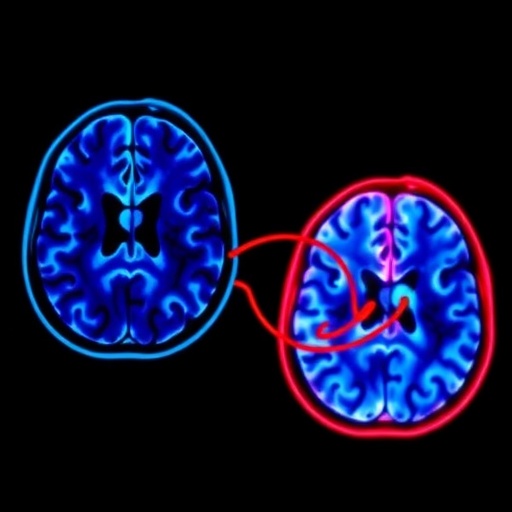Recent research has illuminated a complex link between type 2 diabetes mellitus (T2DM) and cognitive impairment, unveiling the intricate biological pathways that underpin brain function in diabetic patients. This groundbreaking study employs innovative amide proton transfer (APT) imaging techniques to explore cerebral metabolic alterations associated with cognitive decline, advancing our understanding of how diabetes affects neurological health. The work, led by Jiang et al., offers a comprehensive analysis of brain metabolism in individuals suffering from T2DM, presenting compelling findings that could encourage future interventions.
The study meticulously investigates the metabolic landscape of the brain, highlighting the specific alterations in biochemical markers that are indicative of cognitive impairment in the context of T2DM. Amide proton transfer imaging, a powerful magnetic resonance technique, provides a non-invasive means to explore cellular environments and metabolic processes in vivo. This study marks a significant stride in neuroimaging, revealing not just structural, but also functional changes in the diabetic brain that correlate with cognitive dysfunction.
Cognitive decline in T2DM patients has long been acknowledged, but the precise mechanisms have remained elusive. With over 450 million adults affected globally by diabetes, understanding its neuropsychological repercussions becomes increasingly crucial. The research led by Jiang et al. paves the way for future studies to delve deeper into the relationship between metabolic dysregulation and cognitive health, offering hope for early detection and prevention strategies targeting neurodegeneration.
APT imaging exploits the unique properties of amide protons in proteins and peptides, making it an invaluable tool in the study of metabolism. By highlighting changes in these protons that are associated with pathological states, researchers can draw correlations between altered brain metabolism and cognitive outcomes for T2DM patients. The precision of this imaging technique allows for detailed assessments of the biochemical milieu of the brain, further clarifying the relationship between metabolic health and cognitive function.
The findings from this study provide a critical window into the biochemical disruptions occurring in the diabetic brain. For instance, the researchers demonstrated distinct shifts in the levels of particular metabolites that are characteristically associated with neurodegeneration. These results suggest that the metabolic disturbances in T2DM extend beyond peripheral tissues, significantly impacting cognitive faculties through alterations in central nervous system biochemistry.
Cerebral metabolism is fundamentally linked to neuronal health. The data emerging from Jiang et al.’s research highlights how conditions like T2DM may alter the homeostatic balance critical for optimal brain function. It raises pertinent questions about the timing of therapeutic interventions, as early metabolic disturbances might be mitigated to slow or halt cognitive decline, presenting an intriguing avenue for diabetes management.
As the study draws its conclusions, it emphasizes the potential of APT imaging as a diagnostic tool not only for understanding T2DM-associated cognitive impairment but also for assessing the efficacy of therapeutic strategies. There is a growing urgency in the scientific community to find methods that can stratify risk in diabetic populations—a challenge that this research effectively addresses by providing quantifiable metabolic markers indicative of cognitive decline.
Ultimately, this pioneering research serves as a call to action for both clinicians and researchers alike. Understanding the interplay between metabolic and cognitive health can lead to innovative treatment pathways, integrating neuroprotective strategies into the conventional management of T2DM. By adopting a holistic approach to diabetes care, it is possible to mitigate the cognitive risks associated with the disease, significantly improving the quality of life for millions of affected individuals.
To maximize the impact of these findings, ongoing research must ensure that APT imaging becomes part of standard diagnostic protocols. Continuous advancements in imaging technology could soon allow for rapid, widespread screening of cognitive health in diabetic patients, ultimately leading to preemptive strategies tailored to individual metabolic profiles. By connecting metabolic dysfunction with cognitive outcomes, healthcare providers can better navigate pathways to improved patient care, recognizing the brain as a crucial organ in the total health of individuals with diabetes.
Moreover, public health initiatives must encompass education regarding the cognitive risks associated with T2DM. As diabetes prevalence continues to rise, fostering awareness is essential, empowering those at risk to engage in preventative measures. Simple lifestyle changes, including dietary modifications and regular physical activity, can significantly impact not only metabolic health but also cognitive resilience.
In conclusion, Jiang et al.’s research contributes to a growing body of evidence supporting the importance of metabolic health in cognitive function. The integration of advanced imaging techniques opens new doors for understanding the complexities of diabetes and its wide-ranging effects on the brain. As researchers unravel the connections between cerebral metabolism and cognition, the implications for treatment modalities, public health policies, and individual patient care will undoubtedly be profound.
Subject of Research: The relationship between type 2 diabetes mellitus and cognitive impairment, focusing on metabolic alterations in the brain.
Article Title: Amide proton transfer imaging reveals cerebral metabolic alterations associated with cognitive impairment in type 2 diabetes mellitus.
Article References: Jiang, H., Yu, S., Yu, L. et al. Amide proton transfer imaging reveals cerebral metabolic alterations associated with cognitive impairment in type 2 diabetes mellitus. J Transl Med 23, 1059 (2025). https://doi.org/10.1186/s12967-025-07083-0
Image Credits: AI Generated
DOI: 10.1186/s12967-025-07083-0
Keywords: Type 2 diabetes mellitus, cognitive impairment, amide proton transfer imaging, cerebral metabolism, neurodegeneration.
Tags: Amide proton transfer imagingbiochemical markers of cognitive declinebrain metabolism in diabetescognitive dysfunction in diabetes patientsdiabetes and brain function correlationdiabetes and neurological healthinnovative imaging in medical researchmetabolic alterations in T2DMneuroimaging techniques for diabetesnon-invasive brain imaging methodstype 2 diabetes cognitive impairmentunderstanding diabetes neuropsychological effects





